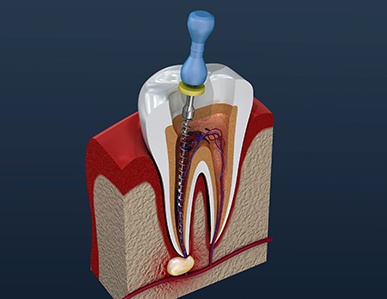
Teeth are designed to last for a lifetime, which is more possible than ever thanks to restorative dentistry. Even with the best prevention, a tooth can be compromised by decay or infection. Your dentist can save your tooth and preserve your natural smile with root canal therapy in Superior. Don't worry about a painful procedure because our office uses the latest technologies and techniques to keep you comfortable.

A root canal is an endodontic treatment used to extract the inner layer of the tooth, called the pulp. Although it's a common procedure, it is only recommended when there aren't any other options besides extraction. While only a dentist in Superior can determine if you need the procedure, certain signs can indicate you may need root canal therapy, including:
Your dentist will examine your mouth and review dental scans to ensure the procedure is necessary. They'll create a personalized treatment plan to rehabilitate your tooth.

After your initial consultation, you will be scheduled for your procedure. A local numbing agent is used to block pain signals, so you won't feel anything during the treatment.
Your dentist will use special dental instruments to remove any decay and remove the nerve center of the tooth. Once the pulp has been extracted, your tooth is sterilized before being sealed with a special material called gutta-percha. It seals your tooth to prevent new bacteria from entering while restoring its strength.
It's not uncommon to require a dental crown after root canal therapy. The custom-made cap is bonded over the entire structure of the tooth above the gum line. This provides an additional protective barrier while reinstating the tooth's function and appearance.
You may have some minor tenderness for a few days. You can manage it using an OTC pain reliever and eating softer foods until your discomfort improves.

Root canals have a reputation for being painful, but don't let rumors stop you from saving your tooth. If you delay the procedure, your tooth may need to be removed. Each tooth is crucial to your dental health. Losing even one can have long-term complications for your smile.
Instead, a root canal can save your tooth before it's too late. You'll avoid common issues associated with missing teeth to reduce your overall oral health expenses.
Besides safeguarding your smile, root canal therapy provides several benefits, including:
If you have a toothache or other concerning symptoms, don't wait to see a dentist. Your comfort is our top priority. We will explain everything to ease any concerns to have 100% confidence about the road ahead. Contact our office today to request your consultation for root canal therapy.

Before we’re able to tell you how much your root canal will cost, there are several different factors that need to be taken into consideration. To get a specific estimate of how much your treatment will be, schedule an appointment with us. We’d be happy to talk with you about your financial options. In the meantime, here are some things for you to take into consideration.

It is very difficult to determine the exact cost of root canal therapy until we’ve had the opportunity to take a look at your smile. Here are some of the factors that can influence the price:

It’s common for patients to want to skip the root canal process by having an extraction instead. Extractions do tend to be more affordable upfront, but you need to consider the long-term costs as well. For example, your bite could be negatively impacted as a result of the surrounding teeth shifting out of place. That would require additional treatments. To prevent this from occurring, it is often recommended that you replace the tooth with a dental implant or bridge, but this means additional costs. A lot of the time, it is more cost-effective to save your natural tooth than pay for an extraction and replace it later in life.

Root canal therapy is considered to be a major procedure, so you can usually expect approximately 50-80% of the cost to be covered after you have met your annual deductible. However, every plan is different, so it’s important to confirm what’s covered with your insurance provider. At Hill Avenue Dental, we are in-network with Delta Dental, but we are also happy to welcome out-of-network providers. We will verify your coverage, file your claims, and do our best to answer any questions you have about how your plan works.

If you don’t have dental insurance, this doesn’t mean that you will be left completely on your own. We work with CareCredit – a third-party financing company that can split the cost of your treatment into manageable monthly installments with little to no interest. To learn more about your financial options, talk to one of our friendly team members.
If you think you may need a root canal, give us a call! We’d be happy to help you with the process.
Your mouth will be numbed with a local anesthetic before the procedure begins, so you shouldn’t feel any pain at all. However, you may experience some soreness for a few days afterward. Fortunately, this is temporary and can be managed with over-the-counter pain relievers. During the recovery period, avoid chewing on hard foods, as this can worsen discomfort. The soreness should start to subside after about three days. If it persists, give us a call so we can help!
In addition to eating a healthy meal and avoiding alcohol before your root canal, stay away from tobacco, as it can interfere with the numbing medication. Most dentists recommend taking over-the-counter pain relievers, like ibuprofen, right before the procedure to reduce the discomfort as the numbness wears off. Get a good night’s sleep before your root canal to lessen your nerves and prepare your immune system for a quick recovery.
In most cases, root canal therapy can be completed in a single appointment. The length of a root canal can take anywhere from 30 to 90 minutes or more, depending on the location of the tooth within the mouth. Molars have more root canals that must be disinfected than front teeth. Generally, the farther back in the mouth you go, the longer your root canal will take.
While antibiotics can treat bacterial infections in almost every other part of the body, they do not work on tooth infections. Antibiotics travel through the bloodstream to target infected areas of the body, but the bloodstream cannot reach the pulp of a tooth. Therefore, they cannot eliminate an infection there. If a tooth’s pulp is infected, the only option to treat it is root canal therapy.